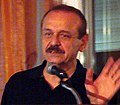# Name Image Ministerial Portfolio Party Notes 1 Yasser Arafat President of the Palestinian National Authority and Minister of Interior Fatah Chairman of the PLO Executive Committee from the previous government 2 Faisal Husseini Minister of Jerusalem Affairs Fatah Member of the PLO Executive Committee from the previous government 3 Nabil Ali Rashid Shaath Minister of Planning and International Cooperation Fatah Member of the First Palestinian Legislative Council for Khan Yunis from the previous government 4 Saeb Mohammed Saleh Erekat Minister of Local Government Fatah Member of the First Palestinian Legislative Council for Jericho from the previous government 5 Hikmat Hashem Lutfi Zaid Minister of Agriculture Fatah Member of the First Palestinian Legislative Council for Jenin 6 Intissar Mustafa Mahmoud al-Wazir Minister of Social Affairs Fatah Member of the First Palestinian Legislative Council for Gaza from the previous government 7 Freih Mustafa Freih Abu Middein Minister of Justice Fatah Member of the First Palestinian Legislative Council for Deir al-Balah from the previous government 8 Maher Nashat Taher al-Masri Minister of Economy and Trade Fatah Member of the First Palestinian Legislative Council for Nablus from the previous government 9 Jamil Yousef Mislah al-Tarifi Minister of Civil Affairs Fatah Member of the First Palestinian Legislative Council for Ramallah and al-Bireh from the previous government 10 Azzam Najeeb Mustafa al-Ahmad Minister of Public Works Fatah Member of the First Palestinian Legislative Council for Jenin from the previous government 11 Abdel Rahman Tawfiq Abdel Hadi Hamad Minister of Housing Fatah Member of the First Palestinian Legislative Council for North Gaza from the previous government 12 Abdel Aziz Ali Abdel Aziz Shahin Minister of Supply Fatah Member of the First Palestinian Legislative Council for Rafah from the previous government 13 Rafiq Shaker Darwish al-Natsheh Minister of Labor Fatah Member of the First Palestinian Legislative Council for Hebron 14 Riyad Dheeb Saleem Zanoun Minister of Health Fatah Member of the First Palestinian Legislative Council for Gaza from the previous government 15 Nabil Mahmoud Yousef Amr Minister of Parliamentary Affairs Fatah Member of the First Palestinian Legislative Council for Hebron 16 Saadi Mahmoud Suleiman al-Karnaz Minister of Industry Fatah Member of the First Palestinian Legislative Council for Deir al-Balah 17 Ali Ibrahim Ghazal al-Qawasmi Minister of Transport Fatah Member of the First Palestinian Legislative Council for Hebron from the previous government 18 Mitri Tanas Jaris Abu Aita Minister of Tourism Fatah Member of the First Palestinian Legislative Council for Bethlehem 19 Talal Mohammed Abdul Razaq Seder Minister of State Independent from the previous government 20 Imad Abdul Hamid Abdul Hadi al-Falouji Minister of Telecommunications Independent Member of the First Palestinian Legislative Council for North Gaza from the previous government 21 Yasser Abdul Majid Adib Abed Rabbo Minister of Culture and Information FIDA Party Member of the PLO Executive Committee from the previous government 22 Mohammed Zuhdi al-Nashashibi Minister of Finance Independent Member of the PLO Executive Committee from the previous government 23 Munther Salah Minister of Higher Education Independent 24 Yousef Atta Allah Ibrahim Abu Safieh Minister of State for Environmental Affairs Fatah Member of the First Palestinian Legislative Council for North Gaza 25 Hisham Ali Hassan Abdel Razek Minister of State for Prisoners Affairs Fatah Member of the First Palestinian Legislative Council for North Gaza 26 Ziad Ali Khalil Abu Zayyad Minister of State for Jerusalem Affairs Fatah Member of the First Palestinian Legislative Council for Jerusalem 27 Hassan Mohammed Ahmed Asfour Minister of State for NGO Affairs Palestinian People's Party Member of the First Palestinian Legislative Council for Khan Younis 28 Bashir Barghouti Minister of State Palestinian People's Party from the previous government 29 Nabil Qassis Minister of State for Bethlehem Affairs Independent 30 Ahmed Abdel Rahman Secretary General of the Cabinet Fatah from the previous government 










